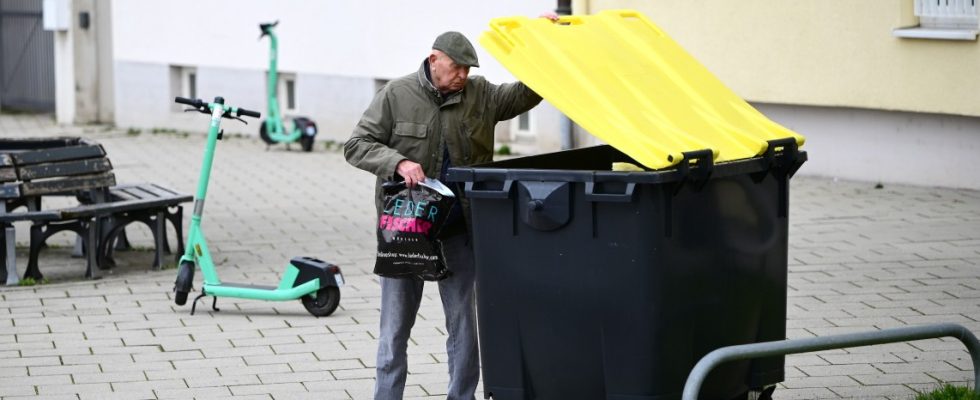The beginning has been made, “the first hundred signatures have already been collected,” reports Ulrich Grasberger, the chairman of the “Müllwende” association, which was founded last summer. He wants to have 40,000 supporters within a year, by March 2025. Even if illegible or invalid names are removed, that should be enough to get his issue on the city council’s agenda, he believes. Grasberger has just launched a citizens’ initiative with his board members: “Yes to the yellow bin”.
If it is successful, it could indeed lead to a waste transition away from a drop-off system and towards a pick-up system. If enough signatures are collected, the city council must deal with the issue: it can then accept the request – or must make its own proposal against it, which will then be voted on in a referendum.
The initiators of “Yes to the Yellow Bin” have their arguments neatly posted on their website muellwende.org listed. They are primarily concerned with recyclable waste, which is practically not recycled in the city. Most of it ends up in the residual waste bin and is then simply burned. Only a third of what ends up in residual waste actually belongs there. “Correctly separated waste is valuable raw material that we should secure for further use,” warned Stefan Böhme, President of the Association of Bavarian Waste Management Companies (VBS), recently on the occasion of “International Day of Waste Separation” on March 7th.
In Munich, recyclable waste must be taken to so-called recycling islands, of which around 900 are spread across the city. And can sometimes be a major nuisance for local residents. “Munich is the only major city in Germany that collects using containers and the delivery system on streets and green spaces in the middle of residential areas,” explain Grasberger and Co. in their call for participation in their request. Everyone can see “the chaos around the garbage containers”: burst garbage bags, empty bottles, dirty boxes: “In Munich, the garbage is on the streets and in green spaces.”
Even if that may seem exaggerated: “Munich has a garbage problem,” says Tobias Ruff, who sits on the city council for the ÖDP and is one of the supporters of the citizens’ initiative. “We create too much waste, leave too much of it in the landscape and recycle too little,” says Ruff, summarizing the situation.
Only 5.7 kilos of packaging waste per person
Munich is “at the bottom of the list nationwide in terms of packaging waste recorded per capita,” VBS managing director Rüdiger Weiß recently confirmed. He estimated the packaging waste collected annually in Munich at 5.7 kilograms per person – less than a fifth of the nationwide average of 32 kilos. Grasberger has calculated that Munich is ahead when it comes to residual waste, with an annual total of 200 kilos per capita. Nationwide, the average is between 120 and 130 kilos.
Felix Meyer, board member of the Munich FDP, considers the concept of recycling islands to be “failed”. The islands are “always overcrowded,” he says, “and yet we collect less trash than other cities.” That’s why he and his party join the Müllwende eV: “We have to change the system.”
Those responsible for the citizens’ initiative want to ask the city to have another garbage can picked up in addition to the gray residual waste and blue waste paper bins – a yellow one, into which at least plastic packaging can be thrown. The best solution would be a recycling bin in which metal and composite materials could also be recycled, says Dorit Zimmermann from the Munich district group of the Federal Environment and Nature Conservation Germany (BUND). Her organization also supports the citizens’ initiative: “We stand behind it because we think the content is correct.”
But why is the citizens’ initiative needed when the city already started a pilot project with yellow bags, yellow bins and recycling containers in five districts on January 1st? You don’t need to approach the environmentalists with the question. “The test phase is already underway with the question mark as to whether it was even needed,” replies FDP man Meyer. The BUND representative Zimmermann thinks: “The entire test operation could have been saved.” After all, there has been enough experience in other municipalities that one could draw on in Munich.
Kristina Frank (CSU), as a municipal representative and head of the waste management company, defended the pilot project by saying that Munich “is not comparable to other cities in terms of settlement structure.” She also pointed out that truck traffic would increase significantly if 800,000 households had to be served instead of 900 recycling islands.
Grasberger does not accept this argument because not every household is approached individually when collecting the yellow bins. “The bottom line is that nothing will change,” believes Dorit Zimmermann. There is also a lot of private car traffic on the way to the recycling islands, which would be eliminated with the collection system. She suspects that people are more afraid of the amount of work required to convert a system that has been used for decades.
In any case, the initiators of the citizens’ initiative consider the pilot project to be just “an extension of the misery for another three years,” as Grasberger puts it. That’s why he wants to push the issue “so that it doesn’t go under again.”

